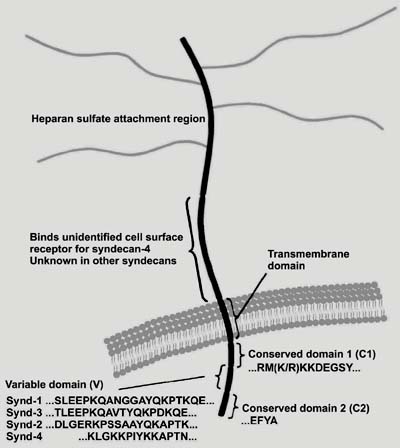The syndecans, heparan sulfate proteoglycans, are abundant molecules associated with the cell surface and extracellular matrix and consist of a protein core to which heparan sulfate chains are covalently attached. Each of the syndecan core proteins has a short cytoplasmic domain that binds cytosolic regulatory factors. The syndecans also contain highly conserved transmembrane domains and extracellular domains for which important activities are becoming known. These protein domains locate the syndecan on cell surface sites during development and tumor formation where they interact with other receptors to regulate signaling and cytoskeletal organization. The functions of cell surface heparan sulfate proteoglycan have been centered on the role of heparan sulfate chains, located on the outer side of the cell surface, in the binding of a wide array of ligands, including extracellular matrix proteins and soluble growth factors. More recently, the core proteins of the syndecan family transmembrane proteoglycans have also been shown to be involved in cell signaling through interaction with integrins and tyrosine kinase receptors.
Syndecans; Heparan sulfate proteoglycans; Protein kinase C; Growth factors; Cell signaling







